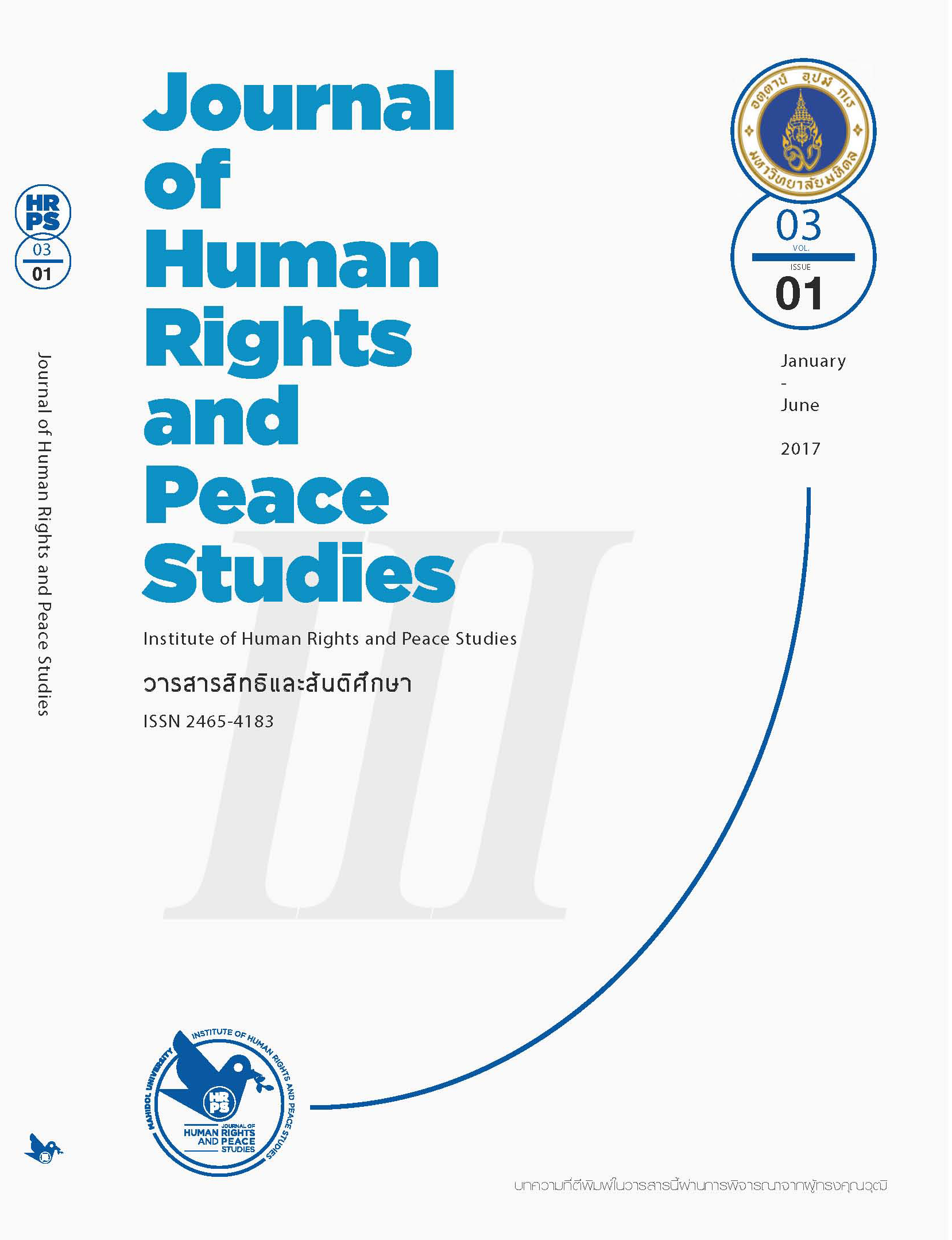ข้อเสนอการแปลงเปลี่ยน ความขัดแย้งชายแดนใต้ ผ่านการผสานวัฒนธรรม และการปกครองร่วมกัน
Main Article Content
บทคัดย่อ
สถานการณ์ความรุนแรงในชายแดนใต้ได้ยืดเยื้อมากว่าทศวรรษแล้ว โดยมีความซับซ้อนและตัวละครความขัดแย้งจำนวนมาก ในการคลี่คลายความขัดแย้งเช่นนี้ มีความจำเป็นที่จะทำความเข้าใจเป้าหมายของตัวละครที่เกี่ยวข้อง แต่น่าเสียดายที่ขบวนการต่อสู้ด้วยอาวุธไม่ได้เสนอเนื้อหาของข้อเรียกร้อง ของตนอย่างชัดเจน บทความนี้ได้ย้อนไปพิจารณาข้อเรียกร้อง 7 ข้อที่ฮัจญี สุหลง ผู้นำศาสนาคนสำคัญได้ให้ไว้เมื่อ 70 ปีก่อน และนำมาประกอบกับ ข้อเสนอของภาคประชาสังคมในปัจจุบัน แล้วนำมาคัดกรองเป็นประเด็นสำคัญ สองประเด็นคือ การสร้างสรรค์สังคมพหุวัฒนธรรมที่ไม่แยกส่วน หากมีการผสานวัฒนธรรมอันหลากหลายเข้าด้วยกันโดยเคารพความแตกต่าง และการ พัฒนาการปกครองท้องถิ่นรูปแบบพิเศษที่เป็นไปตามเจตนารมณ์ของคนใน ท้องถิ่น บทความนี้ได้วิเคราะห์ประเด็นทั้งสองไว้ในเบื้องต้น และมีข้อเสนอเพื่อ แปลงเปลี่ยนความขัดแย้งในชายแดนใต้ว่าน่าจะมีการศึกษาประเด็นทั้งสอง เพิ่มเติม และตัวละครที่เกี่ยวข้องควรถกแถลงและแลกเปลี่ยนความคิดเห็น ในประเด็นดังกล่าวเพื่อให้เห็นแนวทางที่เป็นไปได้ที่จะนำประเด็นที่เป็นหลักการเหล่านี้ไปสู่การปฏิบัติ โดยหวังว่าคณะพูดคุยสันติภาพ/สันติสุขจะได้หยิบยกขึ้น เป็นวาระและทำเป็นเนื้อหาของการตกลงกันต่อไป
Article Details
ทัศนะ ข้อคิดเห็น ภาพที่ปรากฏในวารสารเล่มนี้ เป็นความคิดเห็นส่วนตัวของผู้เขียน บรรณาธิการและกองบรรณาธิการไม่จำเป็นต้องเห็นพ้องและไม่ถือเป็นความรับผิดชอบ ลิขสิทธิ์ในบทความเป็นของผู้เขียนและสถาบันสิทธิมนุษยชนและสันติศึกษา มหาวิทยาลัยมหิดล ห้ามผลิตซ้ำ เก็บในระบบที่ค้นหาได้ หรือเผยแพร่ต่อส่วนใดส่วนหนึ่งของวารสารเว้นแต่จะได้รับอนุญาตเป็นลายลักษณ์อักษรจากบรรณาธิการ หรือได้รับอนุญาตตามกฎหมาย หรือตามเงื่อนไขขององค์กรลิขสิทธิ์ภาพถ่ายหรือกราฟฟิก สงวนลิขสิทธิ์ในการนำไปใช้ประโยชน์ในเชิงพาณิชย์ การนำไปใช้โปรดอ้างอิงให้ถูกต้องตามหลักวิชาการ
เอกสารอ้างอิง
คณะกรรมการอิสระเพื่อความสมานฉันท์แห่งชาติ (กอส.). (2506). เอาชนะ
ความรุนแรงด้วยพลังสมานฉันท์. กรุงเทพฯ.
คณะทำงานยุทธศาสตร์สันติวิธี. (2559). ตัวแสดงระหว่างประเทศในความ
ขัดแย้งถึงตายที่ชายแดนใต้. กรุงเทพฯ: ภาพพิมพ์.
คมชัดลึก. (2556). บีอาร์เอ็น และ “อามีน โต๊ะมีนา”. ค้นเมื่อ 28 กรกฎาคม 2560,
จาก https://www.komchadluek.net/news/scoop/153774
จอห์น พอล เลเดอรัค. (2555). พลังธรรมแห่งจินตนาการ. นครปฐม: สถาบัน
สิทธิมนุษยชนและสันติศึกษา มหาวิทยาลัยมหิดล.
นาซือเราะ เจะฮะ. (2558). เด่น โต๊ะมีนา: 7 ข้อ ฮัจญีสุหลง - 5 ข้อ BRN รัฐให้ได้
ภาคใต้สงบ. ค้นเมื่อ 28 กรกฎาคม 2560, จาก https://www.isranews.
org/south-news/academic-arena/item/40618-den.html
นิติธร วงศ์ยืน. (2560). ดะโต๊ะยุติธรรมประจำศาลเยาวชนและครอบครัว
จังหวัดปัตตานี นราธิวาส ยะลา และสตูล: ความเป็นมาซึ่งควรบันทึกไว้.
ค้นเมื่อ 28 กรกฎาคม 2560, จาก https://elib.coj.go.th/Article/
courtP6_4_3.pdf
บะห์รูน. (2548). ญิฮาดสีเทา ใครสร้าง ใครเลี้ยงไฟใต้. หน้า 115 - 116
กรุงเทพฯ: สาริกา.
ฟาฏินา วงศ์เลขา. (2560). “ทวิภาษา” แก้ปัญหาอ่านไม่ออก - เขียนไม่ได้.
ค้นเมื่อ 28 กรกฎาคม 2560, จาก https://www.moe.go.th/moe/th/
news/detail.php?NewsID=45099&Key=news_research
โรงเรียนนักข่าวชายแดนใต้. (2559). สภาประชาสังคมใต้แถลงยุทธศาสตร์ใหม่
สร้างพื้นที่กลาง - ผลักดันประชาชนร่วมกระบวนการสันติภาพ. ค้นเมื่อ
28 กรกฎาคม 2560, จาก https://www.deepsouthwatch.org/dsj/
th/8759
สำนักงานสภาความมั่นคงแห่งชาติ. (2560). นโยบายการบริหารและการพัฒนา
จังหวัดชายแดนภาคใต้ พ.ศ. 2560 - 2562. ค้นเมื่อ 30 กรกฎาคม 2560,
จาก https://www.nsc.go.th/Download1/นโยบายการบริหารและ
การพัฒนาจังหวัดชายแดนภาคใต้%20พ.ศ.%202560-2562.pdf
อับดุลเลาะ หวังหนิ. (2558). “มารา ปาตานี” เปิด 3 ข้อเรียกร้องจี้ “ประยุทธ์”
ใช้ ม.44 ประกาศวาระแห่งชาติ. ค้นเมื่อ 28 กรกฎาคม 2560,
จาก https://www.isranews.org/isranews-article/item/40932-
mara_40932.html
อามาตยา เซน (เขียน) ศิโรตม์ คล้ามไพบูลย์ (แปล). (2555). อัตลักษณ์และความ
รุนแรง. หน้า 111 - 114. นครปฐม: สถาบันสิทธิมนุษยชนและสันติศึกษา
มหาวิทยาลัยมหิดล.
อิมรอน. (2558). 419 NGOs ช่วยแก้หรือซ้ำเติมปัญหาไฟใต้. ค้นเมื่อ 28
กรกฎาคม 2560, จาก https://pulony.blogspot.com/2015/01/419-
ngos.html
Deep South Watch. (2556). ข้อเรียกร้องเบื้องต้น 5 ประการของ BRN: ต้นฉบับ
และบทแปลหลากสำนวนหลายภาษา. ค้นเมื่อ 28 กรกฎาคม 2560,
จาก www.deepsouthwatch.org/node/4635
Deep South Watch. (2559). รายงานฉบับสมบูรณ์ผลการสำรวจความคิดเห็น
ประชาชนต่อกระบวนการสันติภาพในจังหวัดชายแดนภาคใต้ (Peace
Survey) ครั้งที่ 1 (กุมภาพันธ์ - มีนาคม 2559). ค้นเมื่อ 28 กรกฎาคม
2560, จาก https://www.deepsouthwatch.org/node/9617
Deep South Watch. (2560). บทสรุปผู้บริหาร ผลการสำรวจความคิดเห็น
ประชาชนต่อกระบวนการสันติภาพจังหวัดชายแดนภาคใต้ [Peace
Survey] ครั้งที่ 2. ค้นเมื่อ 28 กรกฎาคม 2560 จาก https://deep-
southwatch.org/sites/default/files/bthsrupphuubrihaar-
ps2_03012017.pdf
ภาษาอังกฤษ
Avruch, Kevin. (2006). Culture and Conflict Resolution. Washington
D.C.: United States Institute of Peace.
Baumann, Gerd. (1999). The Multicultural Riddle.
London: Routledge.
Curle, Adam. (1971). Making Peace. London: Tavistock.
Galtung, Johan. (1958). Theories of Conflict: Definitions, Dimension,
Negations, Formations. USA: Columbia University.
Gunaratna, Rohan; Acharya, Arabinda. and Chua, Sabrina. (2005).
Conflict and Terrorism in Southern Thailand. Singapore:
Marshall Cavendish International.
Parekh, Bhikhu. (2006). Rethinking Multiculturalism: Cultural Diversity
and Political Theory. New York: Palgrave Macmillan.
Rattansi, Ali (2011). Multiculturalism: A Very Short Introduction.
New York: Oxford University Press Inc.
Taylor, Charles. (1994). Multiculturalism and the Politics of
Recognition. New Jersey: Princeton University Press.
Varshney, Ashutosh. (2002). Ethnic Conflict and Civic Life. New Delhi:
Oxford University Press.
Watson, C. W. (2010). Multiculturalism. Berkshire: Open University
Press.
Widjojo, Muridan. S. (editor). (2010). Papua Road Map. Singapore:
ISEAS Publishing.


